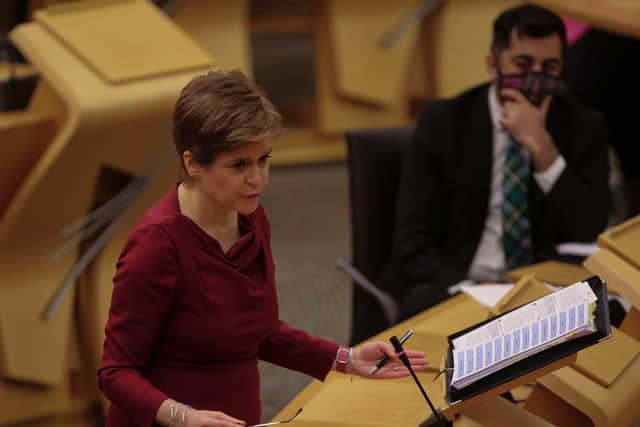New Covid measures expected ‘within weeks’ and self isolation time cut - What Nicola Sturgeon said today
and live on Freeview channel 276
Nicola Sturgeon announced the change to the self-isolation period during a recall of parliament on Wednesday for an urgent update on the Covid-19 situation.
What are the new rules?
Those who test positive for Covid will now have the option to end their self-isolation after seven days, providing they do not have a fever and they record two negative lateral flow tests, on days six and seven.


Advertisement
Hide AdAdvertisement
Hide AdThe self-isolation requirement for close contacts of positive cases has also been removed for children, and adults who have received three vaccine doses. Instead, these contacts, including household contacts, will be asked to take a lateral flow test every day for seven days.
Those who test positive for Covid by lateral flow test will also no longer be required to confirm this by PCR.
All changes will come into effect from midnight on Wednesday.
Will there be new restrictions?
Meanwhile, crowd numbers will be capped at just 500 for outdoor events and 200 for indoors shows until January 17 as part of the Scottish Government’s strategy of trying to stop the new Omicoron variant of Covid spreading in “high-risk” settings.
Advertisement
Hide AdAdvertisement
Hide AdFirst Minister Nicola Sturgeon said the current pressures on the health service and the country’s high Covid rates – which suggest that one in 20 of the population were infected last week – were likely to be even more severe without restrictions on potential “super-spreader” events.
However she admitted that the current restrictions on public life in Scotland were "not sustainable indefinitely” and suggested that new ways of managing Covid would be more proportionate and sustainable, and less restrictive."
Hundreds of events and shows were called off after the Scottish Government announced new restrictions on live events four days before Christmas for “up to three weeks.”
However Jason Leitch, Scotland’s national clinical director, has since suggested that large-scale events may not be possible until after April.
Advertisement
Hide AdAdvertisement
Hide AdThe current measures, which took effect from Boxing Day, insist that one metre physical distancing is enforced in all indoor and outdoor settings, and could impact on events like Glasgow’s Celtic Connections music festival.
What did Nicola Sturgeon say?
Ms Sturgeon said: “With the virus so prevalent, we do consider it important to continue to apply some brake on transmission, particularly in settings posing the highest risk.
"Accordingly, I can confirm that the restrictions on large gatherings, the requirement for distancing between groups in public indoor places and for table service in hospitality venues serving alcohol on the premises will remain in force for now and, I expect, until 17 January.
“While this is not a legal requirement, we are continuing to advise the general public to limit contact with people in other households as far as possible, and to limit the number of households in any indoor gathering to a maximum of three.
Advertisement
Hide AdAdvertisement
Hide Ad“After two long years of this pandemic, asking people to cut all social interaction is not feasible - and it would be damaging to mental health and wellbeing.
“However, limiting contacts and thinking carefully about the interactions that matter most to us is important just now.”
‘More resilient’
Ms Sturgeon said the government needed to adapt its thinking on how to manage Covid and become “more resilient” to the virus in future given it was unlikely to "disappear" or for Omicron to be the last new variant to emerge.
She added: “Let me be clear. This does not, in my view, mean giving up trying to control it at all - the impact of Covid on individual health and on our collective wellbeing is too significant for that.
Advertisement
Hide AdAdvertisement
Hide Ad“But it does mean seeking ways of doing so that are more proportionate and sustainable and less restrictive.
"There are no easy answers here, but adapting to the ongoing challenge of Covid is inescapable.
"The Scottish Government is currently working on, and will publish within the next few weeks, a revised strategic framework, which will set out more fully how that process of adaptation can be managed."
Comment Guidelines
National World encourages reader discussion on our stories. User feedback, insights and back-and-forth exchanges add a rich layer of context to reporting. Please review our Community Guidelines before commenting.
